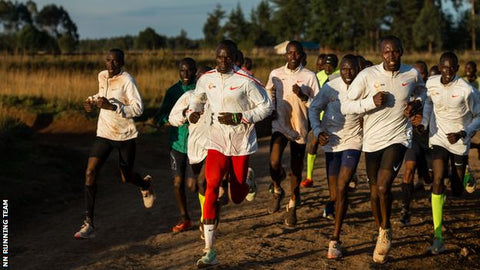Monday
Morning: Easy run: 16-20km, sometimes a little progressive pace up to moderate.
Afternoon: Easy Run: 8-12km
Tuesday
Morning: Every other week,15km of intervals at goal marathon pace work. Or 10-15km of interval work faster than goal marathon pace down towords 800m pace.
Afternoon: Rest
Wednesday
Morning: Same as monday, easy to Moderate Run: 16-21km
Afternoon: Easy Run: 8-12km
Thursday
Morning: 30km or 40km tempo run
Afternoon: Easy run if his body is ready for more training
Friday
Morning: Same as monday, easy to Moderate Run: 16-21km
Afternoon: Easy Run: 8-12km
Saturday
Morning: Fartlek (on trails/road)
Afternoon: Rest or easy 8-12km
Sunday
Morning: *Easy to Moderate Run: 18-22km
Afternoon: Rest

Tuesday Intervals:
Tuesdays typically feature a track session. Essentially, they alternate between two different types of training:
15km of intervals at approximately their targeted marathon pace (2:55 for Eliud). Actually, doing this at altitude and on dirt is a little more difficult than doing it at sea level on a road, but that is also part of the training.
Different Workouts:
- 15x1km (90sec rest) average pace: 2:50-2:55. They might start closer to 3min and end closer to 2:50, but the average is normally between 2:50 and 2:55.
- 12x1200m (90sec rest) average pace: 3:24-3:30.
- 5 sets of (2km, 1km) in 5:40-5:50 and 2:50-2:55.
The second type is 10-15km of intervals faster than marathon pace and down too 800m pace at the end.
Different Workouts:
- 12x800m in 2:10s (90sec rest), 10x400m in 62s (90sec rest).
- 1200m in 3:25, jog lap, 5x1km in 2:55 (1.30 rec), jog lap, 3x300m in 42-40 (1:00 rec), jog lap, 2x200m in 27s (1:00 rec)
- 20x400m in 64-65sec (50sec rest)
Thursday Long Run
Thursdays are long tempo run day. Steady tempo run that lasts between 30 and 40 kilometers (18.6 to 24.8 miles). Depending on how he feels or when a big race is coming up, he might also go for a second run.
Once more, the group departs from the front of the camp at Kaptagat at 6:10 am. As usual, the first 1–2 km of the run are a buildup. To warm up, they'll clock the first kilometer at about 5:00 minutes (typically slower), and by the third, the speed picks up.
Depending on where they are, the pace is 3:00-3:25min/km (4:50-5:20min/mi) after that. They often travel a course that is 90% hilly terrain and 10% road (mostly flat, sometimes small hills). The speed is roughly 3 minutes per kilometer (4.50 minutes per mile) on the flatter, faster stretches of the route. Depending on how hilly it is, the average pace when they reach the hills in the forest ranges from 3:15 to 3:25 minutes per kilometer (5:10 to 5:25 minutes per mile).
Many may be thinking, "3:20min/km isn't his tempo pace (threshold)," despite the fact that this sounds really fast. However, the difficult terrain they train on is located at an elevation of 2400–2500m (7800ft). As per our estimates, running at Kaptagat in the forest should be 20 to 25 seconds per km slower than it would be at sea level on a flat road. Expect to run 10-15 seconds per kilometer slower on the flat road parts up at Kaptagat.
Here are some times of his tempo runs leading uo to the 2017 Berlin Marathon :
Thursday August 10 – 30.8km in 1:42 (3:20min/km average)
On this training, one part of the track was so muddy, they needed to change course and they ended up just running back to the starting point, which ended up being an extra 800m.
Thur August 17 – 40km in 2:14 (3:20min/km average)
Thur August 24 – 30km in 1:38 (3:16min/km average)
Thur August 31 – 40km in 2:13 (3:19min/km average)
Saturday Speed Workout:
For Eliud Kipchoge, a Saturday consists of a fartlek (or "speed") exercise in the morning and either an afternoon off or a second easy run of 10 to 12 kilometers, depending on how they feel.There are 7 different fartlek workouts Eliud Kipchoge uses in his training.
1. 10min reps with 2min rest. 4 x 10min is most common, sometimes they do 5.
2. 8mins reps with 2min rest. 6 x 8min is most common.
3. 6min reps with 2min rest. 8 x 6min is most common.
4. 4min reps with 2min rest. 10 x 4min is most common.
5. 3min reps with 1min rest. 13 x 3min is most common, sometimes they do 14-15.
6. 2min reps with 1min rest. 17 x 2min is most common, sometimes they do up to 20.
7. 1min reps with 1min rest. 25 x 1min is most common, sometimes they do up to 30.
The most common sessions used are:
* 4x10min reps (2min rest)
* 13x3min reps (1min rest)
* 25x1min reps (1min rest)
These seem to be used around twice as often as the others.
Since the roads they take are hilly, it is impossible to report paces throughout these workouts' intervals, therefore reps naturally fluctuate greatly in speed. However, on level roads, the pace for the 10 minute reps is typically 2:55 minutes per km, and for the one minute reps, it is 2:45 minutes per km.
This workout's warm-up and cool-down segments typically last 10 minutes, but they can occasionally last up to 15 minutes. In the west, it's typical to increase your warm-up and cool-down miles significantly (some people run for up to 30 minutes), but for Kipchoge, this was brief and to the point.
4x10 with a 2-minute break. The workout time, including warm-up and cool-down, was less than one hour and twenty minutes. They ran 2km in under 10 minutes, stretched for 2 minutes, and then got right into it. They walked for less than two minutes after the final rep before starting the cool down.
On Saturday afternoons, they typically rest and don't run at all; if they do, it's a short, easy run of about 8 to 12 kilometers.


